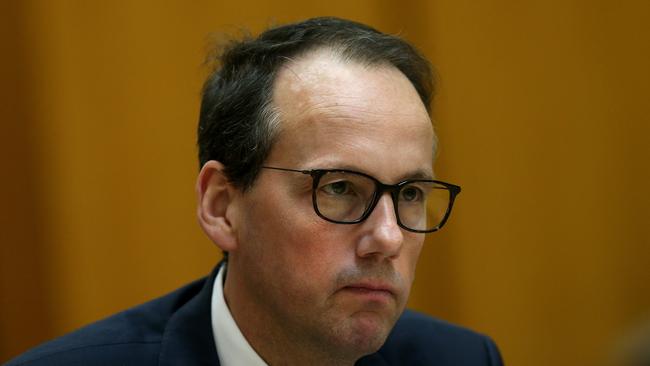AMP may face charges: ASIC
ASIC has revealed it is working with the DPP over AMP after the financial scandal sparked by the royal commission.

The corporate watchdog has revealed it is working with the Director of Public Prosecutions over wealth management group AMP after the financial scandal sparked by the royal commission.
Appearing before the House of Representatives economics committee yesterday, Australian Securities & Investments Commission head of enforcement Tim Mullaly said the regulator was “consulting with the DPP” on its AMP investigation as it combed through more than 600,000 documents it obtained from the group over the past month.
ASIC conducts some prosecutions of minor criminal matters but refers more serious matters to the DPP, which conducts those prosecutions in court if it believes wrongdoing has taken place. Mr Mullaly said ASIC would be in a position to finalise its investigation into AMP by September.
An AMP spokesman decline to comment.
The admission came during an intense hearing in Canberra, where new ASIC chairman James Shipton delivered a stirring defence of the corporate watchdog that has come under criticism for failing to properly enforce standards in the scandal-ridden financial sector.
Pointing to 160 criminal convictions and 140 civil penalty proceedings and 800 banned advisers and credit providers over the past seven years, along with 280 current investigations and more than 1000 ongoing regulatory interventions, Mr Shipton said ASIC had a strong enforcement track record.
His comments come after incoming AMP chairman and former Commonwealth Bank chief David Murray hit out ASIC during the week, accusing the former chairman of not focusing enough on enforcing the law against financial services companies.
“This was an organisation not focused on its main job, which was to be the cop on the beat in the financial sector,” Mr Murray said during the week.
Mr Medcraft was chairman of ASIC from May 2011 until November last year.
Mr Shipton warned he would use “every inch” of ASIC’s new powers to restore trust in the sector and called on the industry to “immediately” rid their businesses of conflicts of interests before the royal commission into banking and financial services hands down its recommendations early next year.
The royal commission into banking and financial services has focused on the role trailing commissions have played in poor consumer outcomes, and the industry is now moving to expel them.
Westpac’s BT Financial Group recently said it was banning them from its business.
Legacy products account for about a third of AMP wealth management’s total assets under management, but generate an inordinate 54 per cent of the division’s revenue, as many products still generate grandfathered trailing commission, according to UBS analysis this week.
While the rest of the developed world had moved to clean out their respective financial sectors in the wake of the global financial crisis, Mr Shipton said Australia had suffered a “lost decade” where it had failed to heed the lessons of overseas jurisdictions that overhauled their financial sectors.
“We are calling on the industry to embark on that endeavour immediately, right now, in Australia,” Mr Shipton said, urging a “wholesale review of where conflicts of interests exist inside institutions and the financial system more broadly” and to “deal with them and remediate them”.
“That is an urgent call to action and that is desperately needed by the system for it to regain the confidence and trust of the public,” he said.
Mr Shipton said ASIC was in “very productive talks” with the government about funding increases to put officers inside large financial institutions, for a bigger watchdog role in the $2.6 trillion superannuation system and for more regulatory technologies.
Meanwhile Mr Shipton said there was “a very limited amount” he could reveal about the status of the AMP investigation.
Mr Shipton said ASIC was “not surprised at all” by the testimony heard in the royal commission. Noting it was “part of a long sophisticated investigation that we intend to carry on and carry through”.
At the banking royal commission, senior counsel assisting Rowena Orr QC had asked commissioner Kenneth Hayne to decide criminal breaches of the law were committed by AMP as it misled ASIC.
Ms Orr told the royal commission that it should be open to finding that in four of the 20 times AMP misled ASIC over a fee-for-no-service scandal it breached four sections of the Corporations Act that carry criminal penalties, attracting a fine of up to $180,000, and one section of the ASIC Act.
AMP head of financial advice Jack Regan admitted to the royal commission that the company had misled ASIC no fewer than 20 times over the fee-for-no-service scandal. Evidence before the commission also suggested AMP executives put heavy pressure on Clayton Utz, which was compiling an independent report on AMP’s wrongdoing, to downplay the role in the debacle of former advice boss Rob Caprioli and to remove Mr Meller’s name from the final document. It heard Clayton Utz gave AMP 25 drafts of the report, removing Mr Meller’s name so that it would not “attract unnecessary attention to him by ASIC” before inserting a paragraph that exonerated him.
The scandal has claimed the scalps of Mr Meller, former chairman Catherine Brenner, former chief legal officer Brian Salter and three board directors.
ASIC deputy chairman Peter Kell told MPs yesterday that the AMP investigation was a “very serious matter”.
“It is one of the largest financial firms in the country. We need to ensure that firm is operating efficiently and fairly,” Mr Kell said.


